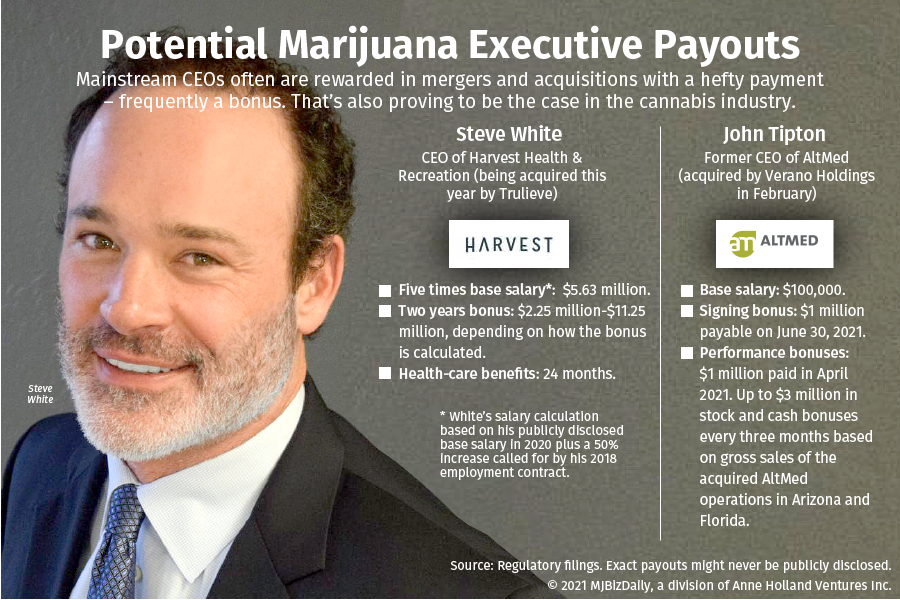The Scotts Miracle-Gro Co. is broadening its move into cannabis by launching a new subsidiary that will allow the Ohio-based lawn and garden giant to invest in emerging areas of the marijuana industry.
The new subsidiary, called The Hawthorne Collective, isn’t wasting any time. The company on Tuesday announced a strategic investment in Toronto-based RIV Capital, which until earlier this year was a subsidiary of cannabis giant Canopy Growth.
The deal makes RIV Capital the Collective’s “preferred vehicle” for cannabis-related investments that are not currently within the purview of the Hawthorne Gardening Co. Hawthorne Gardening is a Scotts Miracle-Gro subsidiary that supplies hydroponics and grow supplies for the cannabis sector.
The investment comes in the form of a six-year, $150 million convertible note, according to a news release. Upon conversion, Scotts Miracle-Gro, through The Collective, would own approximately 42% of RIV.
“The addition of The Hawthorne Collective into our portfolio allows us to explore and pursue new opportunities in an industry that is poised for significant growth in the years ahead,” Scotts Miracle-Gro CEO Jim Hagedorn said in the release.
He indicated the Collective would ultimately allow Scotts to have a stake in plant-touching businesses “as the legal environment changes over time” – an apparent reference to the potential federal legalization of marijuana in the United States.
The RIV deal, which is expected to close in the fourth quarter, comes with a “top-up” option to boost that stake to a maximum of 49%.
Under the deal, The Collective would be able to nominate three members to RIV’s board, which will be increased to seven people.
The companies say they share similar visions.
In a phone interview with MJBizDaily, RIV CEO Narbé Alexandrian said RIV and Scotts Miracle-Gro “have the same thesis, the same ideology in mind.”
“Brands are the future. We need to focus on the consumer, versus just focusing on volume and pushing it out to the consumer,” he continued.
“It was kind of like a meeting of the minds. They couldn’t do this alone, and we were in a good place and time for them to use our structure to get into the U.S. (cannabis) market.”
Why RIV?
Scotts Miracle-Gro is going to do through RIV what the company can’t do on its own, considering U.S. federal law still prohibits the drug.
“They (Scotts Miracle-Gro) can’t touch anything that’s plant-touching, because of their ties to the New York Stock Exchange and they’re in the legacy business of equipment and agricultural products,” Alexandrian said.
“So we’re they’re preferred vehicle for doing those types of deals.”
However, the $150 million from The Hawthorne Collective can’t currently be used to invest in plant-touching companies in the U.S.
But Alexandrian said the $150 million can be leveraged to secure ties with those businesses.
For example, the money can be used as collateral to secure further capital.
“You can also use some of the capital for taking out current shareholders of an acquisition target,” Alexandrian said.
“So that’s not going directly into a business; it’s going into a shareholder’s pocket to take their ownership interest in the company.”
The investment from The Collective will be “ring fenced” and kept in a separate bank account.
RIV also has 212 million Canadian dollars ($169.3 million) on the books, which has no restrictions.
“And when we’re looking at acquisition targets, we can also use our shares as public currency in order to do deals,” the Toronto-based CEO said.
Northeast U.S. focus
RIV’s vision isn’t changing.
“Our focus is on developing a multistate operator in some ways,” Alexandrian said.
“In some ways, we want to develop what we call an anti-multistate operator, anti-MSO.”
RIV wants to target companies and operations that are extremely consumer-focused.
“We have an extensive pipeline and some near-term prospects we have been talking to for months now,” Alexandrian said.
“We’re going to continue to focus our efforts on those prospects that we’re going to pull together and build a leading multistate operator.”
RIV’s focus has been on the Northeast, where some states offer limited marijuana licenses.
Alexandrian expects license holders in those markets to have a “power play, to put in Canadian hockey terms.”
“There’s not much competition they’re facing relative to the demand that’s out there,” he said.
“That barrier to entry is very appealing to us, and it’s attractive to many of our peers as well who have been focused on the Northeast market.”
The CEO mentioned Massachusetts, Pennsylvania and New Jersey.
“It’s a very unique circumstance in the U.S.,” Alexandrian said. “You see these small players who are privately owned within a certain state, and they don’t have enough cash flow in order to go into new states.
“They can’t just grab a license and go, because they don’t have the cash to build that out. They don’t have cash for acquisitions. Yet they have a barrier to entry where they own under 20% of the market.
“It’s a very unique circumstance, which is appealing from an acquirer perspective. Focus is key here, and the U.S. is where we want to go.”
First ‘down-list’
As part of the investment deal with The Collective, RIV plans to move to the Canadian Securities Exchange (CSE) from the Toronto Stock Exchange (TSX) – a move that will position the firm to invest in U.S. plant-touching businesses with its own capital.
Dozens of Canadian cannabis businesses have graduated from smaller exchanges to the TSX in recent years (most recently, Avant Brands), in part because of increased exposure to institutional investors.
However, the downside to a TSX listing is that the exchange mostly bars its issuers from doing business in the U.S. cannabis industry.
Since October 2017, the Toronto Stock Exchange and the TSX Venture Exchange have said Canadian companies with direct business ties to U.S. marijuana companies risk being delisted.
“You can’t invest in a (U.S.) cannabis company (if you’re listed) on the TSX. They won’t allow you to,” Alexandrian said.
As such, the completion of The Collective’s investment in RIV is conditional on the Canadian company’s ability to delist its common shares from the TSX and list on the CSE.
The CSE, where many American cannabis companies are already listed, does allow its issuers to be involved in the U.S. plant-touching marijuana industry.
“There hasn’t been anybody who’s done this,” Alexandrian said.
RIV expects trading on the CSE to commence on Aug. 24.
“We’re in a good circumstance that we have the ability to do that and focus on the U.S. market,” Alexandrian said.
“The larger players can’t do that because of their relationships (with stock exchanges and banks).”
Matt Lamers is MJBizDaily’s international editor, based near Toronto. He can be reached at matt.lamers@mjbizdaily.com.





